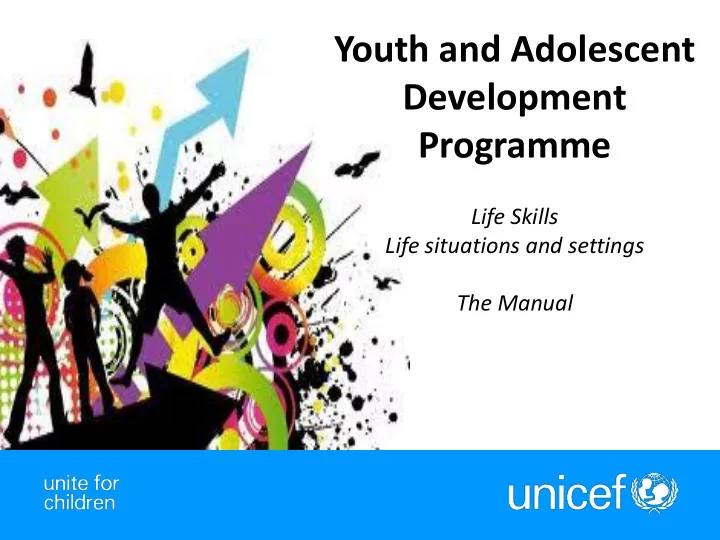

Youth and Adolescent Development Programme Life Skills Life situations and settings The Manual
Life Skills Psychosocial abilities for adaptive and positive behaviour that enable individuals to deal effectively with the demands and challenges of everyday life. They are loosely grouped into 3 broad categories : • cognitive skills for analyzing and using information, • personal skills for developing personal skills and managing oneself, and • inter-personal skills for communicating and interacting effectively with others. Artificial division as they are all inter linked, caring for how we learn rather than for how much we learn
UPDATE • Introduction • 4 sets of skills…and Each skill • Manual chapters • Basic notions • Educational Theories confirm • WHO Basic Life Skills • Division of kills in this manual • Skills and Life settings • Participatory Active Learning
Introduction • The Manual of 2003 • Well used in Jordan and the region with adaptations • Ten years experience+ local regional and international changes • An advisory group: young people and people working on youth programmes • Arabic and English
4 Sets of Skills • Self management skills • Cognitive skills • Social skills • Joint action skills Each set covers 4-6basic life skills
Each Skill covers: A life situation 1-2 paragras: how to deal with life situation A set of exercises that a facilitator can work on with young people for them to earn the skills for managing such life situations Some extra information for the facilitator
Manual Chapters: - Chapter I- Introduction: background and basic notions - Chapter II- Life Skills for Daily Living: self respect, identity and respect the different other - Chapter III- Skills for the Humanitarian Crisis: reinforcing values, developing resilience, responsibility and respect for self and others committing to civic participation and avoiding violence and conflict
Manual Chapters: -Chapter IV- Skills for Civic Participation: Intellectual and social Civic disposition skills, introducing the theory of change and the change process: 1) Identification, of issues and right violations 2) Analysis 3) Action and 4) Reflection -Chapter V- Skills for the Life of Work: promotes work values and introduces employability skills and preparedness to work
Basic Notions: • Youth are assets: potentials and experiences • Resilience vs stress management • Peer education has proven globally successful • Youth development assets are important: BLS, HLS, communication with parents and adults, positive peer interaction, connectedness to adults and role model, effective time use, voluntary community participation • Importance of BLS in a changing world
Educational Theories confirm: Youth need: • Self awareness with the adoption of values • Self expression • The need for an order that does not deny independence and the need to belong to a peer group • The enabling environment that nurtures young people’s self development and protect them from risks while supporting their organisation
Division of skills in this manual Self management skills : Self awareness, elf esteem and confidence, asserting identity, responsibility and stress management Cognitive skills : Creative and critical thinking, decision making and problem solving Social skills : Listening, communication, accepting others, assertiveness and negotiation Joint Action skills: appreciative inquiry, planning, team work, leadership and campaigning
Division of skills in this manual Each chapter presents exercises that help youth to develop these skills in one of the following life situations and settings: • Daily living • Humanitarian situations • Civic participation • Life of work
Skills and Life Settings Skills and life Humanita Civic Daily Living Life of work settings -rian crisis participation Self management : - Self awareness, - self esteem and confidence, -identity, responsibility - stress management Cognitive skills: -Creative thinking - critical thinking, - decision making - -problem solving
Skills and Life Settings Skills and life Humanita Civic Daily Living Life of work settings -rian crisis participation Social skills: Listening, communication, accepting others, assertiveness and negotiation Joint Action skills: appreciative inquiry, planning, team work, leadership and campaigning
Participatory active learning • Promoting creativity, innovation, and reliance on one’s self • The mix of knowledge, skills and attitudes • Use of a variety of tools including: presentations, group work, role play, case studies, brainstorming, simulation, sports, interactive theatre, real action and practical activities, feedback, debriefing, research, interview, self reflection, peer education, ….
Thank you
Recommend
More recommend